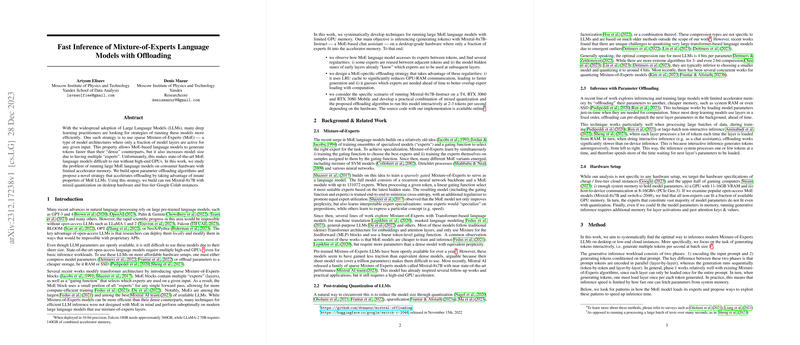Introduction
LLMs have revolutionized natural language processing, but deploying them can be resource-intensive due to their massive size. They frequently require several high-end GPUs for operation, which can be a barrier for those without access to such hardware. This challenge is particularly acute with a subclass of LLMs known as Mixture-of-Experts (MoE) models, which offer efficient token generation but have larger model sizes that make them difficult to run on consumer-grade machines.
Addressing the MoE Challenge
The paper focuses on enabling the use of MoE LLMs on hardware with limited GPU memory, which is critical for making these powerful models more accessible. The research builds on parameter offloading techniques to cope with the limited memory in consumer accelerators. The authors developed tactics to effectively run a large MoE model known as Mixtral-8x7B on standard desktop computers and even free compute instances like Google Colab.
Offloading Strategy and Mixed Quantization
Two significant strategies were introduced: MoE-specific offloading and mixed quantization. The offloading approach observes regularities in how MoE models access their experts, which informed the development of an improved caching method that reduces the need for GPU-RAM data transfer, thus accelerating token generation. Moreover, the method speculatively loads experts for computation after identifying predictable patterns in expert layer usage.
Mixed quantization involves compressing the model parameters to reduce their size, allowing for easier transmission to the GPU. A system design combining the offloading strategies with a mixed MoE quantization scheme is laid out, which tailors the quantization levels for different layers of the MoE models. This strategy reduces loading times without severely compromising model performance.
Experimental Results and Conclusion
Through comprehensive experiments, the research confirms the efficacy of the caching and offloading techniques. When applying these to the Mixtral-8x7B MoE model, substantial increments in token generation speed were recorded across multiple hardware configurations. The authors' implementation was able to generate 2-3 tokens per second, depending on the hardware, showing a clear advantage over naive offloading methods.
This paper offers a significant advancement in the practical deployment of large MoE models, broadening their accessibility. Future work will focus on refining these offloading strategies further and possibly exploring new approaches for speculative expert prediction to enhance performance even on more restricted hardware setups. The source code for this implementation has been made available, encouraging further research and development in this space.
